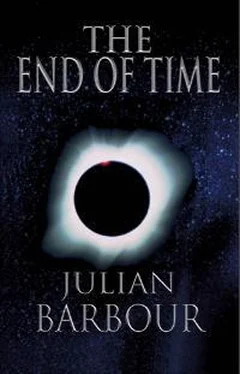Lange, Ludwig 346
Lapchinskii, V. 258
Laplace, Pierre 71, 76, 88
Laplacian determinism, perfect 83, 156, 177
Laue, Max von 190
least action, principle of 111–3
least-time theory 110
Leibniz, Willhelm Gottfried 16, 63–4, 74, 110, 119, 240, 322
on creation 63–4, 110–11
identity of indiscernibles 85–6
principle of sufficient reason 64, 86
satirized as Dr Pangloss 111
Leibniz-Clarke Correspondence 63–4
length of time 19, 100–2, 107, 123, 133, 173
Liebscher, Dierck 6, 73, 346
light
cone 148
diffraction 285
interference 124, 125
polarization 244
quanta (photons) 187, 188, 191, 243–4
rays 269–73
refraction 110
wave theory 124, 125, 269–71
‘line of time’ 27–8
linearity
in quantum mechanics 225, 231, 275
of time 19, 27–8
Littlejohn, Robert 347
Lorentz, Hendrik Anton 128
Lorentz frames 141
Lorentz transformation 141
lottery, cosmic 52–3
Lovelock, James 4
M
Mach, Ernst 65, 153, 334
on inertia 65–6
on time 67
Machian distinguished simplifier 120, 170–1
Mach’s principle 65–6, 113–5
magnetism 124, 126
Makino, Jun 346
many-instants 302–5
many-worlds 53, 221–7, 229–302, 323–4
mass
centre of 79–81
of particles 243–4
matrix mechanics 13, 189, 280
Maupertuis, Pierre 111
Maxwell, James Clerk 15, 124–5
McMillan, Steve 346
McTaggart, John 343
measurement problem 200, 224
measurements 200, 222–4
mechanics 12
Megamolecule Land 43
memory 19, 28, 32–3, 53, 55–6, 300
mental pictures 206–7
Mercury 161
Michelson-Morley experiment 128
Middlemarch 330–1
Midsummer Night’s Dream, A 276
Minkowski, Hermann 12, 138–42, 144, 147, 150–1
Minkowski space-time 141–2, 143, 145, 146, 174
Misner, Charles 167
mist(s) 51, 197
molecules 210, 235
momentum 200
angular 86–90
eigenstates 201
Monadology 111, 240
Moon 98–9, 205, 298
motion 61–70
absolute 62, 119
brain processing 28–30, 267
Descartes on 61–2
as an illusion 39, 46–9, 266–7, 329–35
Newtonian concepts 12, 20–1, 22, 62–3
‘philosophical’ 61
relative 61–2, 63, 119
Mott, Nevill 284, 307, 310, 354
movement see motion
music of the spheres 75, 325–6
N
Neumann, Carl 99–100
Newton, Isaac 11, 12, 20–2, 119
on absolute motion 62
on absolute space 20, 62–3
on absolute time 20
on creation 22
on Descartes 62
laws of 12, 20–1, 22, 64
on making his discoveries 74
on motion 12, 20–1, 22, 62–3
Newtonian space-time 139–40, 146, 174
Newtonian time 107
no-boundary proposal of Hawking 312
Nobel Prize for Physics 187, 235
Nows 16, 18, 34, 40–1, 43, 44–5, 55–6, 174, 177, 333
Einstein on 143
and experiences 51–2, 53–4
and memories 55–6
in relativity 142–6
self-awareness 52–3
O
observables 204
odd numbers rule 93–4
Olivieri, Claudio 333
Omego 328
Ó Murchadha, Niall 35, 349, 352, 358
ontology 138, 301
optics 269–71
optimization 109–13
ovens, heating 185
P
Page, Don 257, 358
Pais, Abraham 123
Pangloss, Dr 111
parabolic motion 94, 95, 96
paradigms 115
Parmenides 1
particles 185–92
mass of 243–4
‘past’ 299, 300 see also history
paths 43–4, 69, 111–3, 118
Pavia 114
pea, number of atoms in 46–8
Penrose, Roger 7, 31, 166, 319, 320, 360
perihelion, advance of 161
persistence of objects 252
phase locking 259
‘philosophical’ motion 61
photons 187, 188, 191, 243–4
physics 38
end of 13–14
quantum versus classical 13, 15–16
Pied Beauty 75, 323
Pinker, Steven 342–3
Planck, Max 13, 185–6
Planck length 311
Planck mass 311
Planck time 311
Planck’s constant 186
planets see solar system
Plato 44, 45
Platonia 44, 45–6, 47, 344
asymmetry of 55, 307–9
for Minkowski space-time 145
for general relativity 167–9
geodesics in 116–17, 118
‘mist’ over 51–6, 197–8
Platonic forms 44, 251
Podolsky, Boris 218
Poincaré, Henri 71, 76, 128, 135–6, 152–3, 156, 180, 346
on duration 123
Point Omega 328
polarized light 244
pond argument 127
position eigenstates 202
potential energy 90–1, 108, 112, 117
preferred-basis problem 226–7, 301
Price, Huw 341
principal function 272
principle theories 134
probability 24, 198–9, 203–4, 356
proper time 150–1, 175
psychophysical parallelism 226, 301–2
Ptolemy, Claudius 99
pulsars 166
Purser, John 325–6
Purser, Michael 5, 325, 336
Pythagoras’ theorem 150
Q
Q space 209
quanta 13 see also photons
quantization 15, 166
quantum cosmology 16, 197, 247, 251, 284, 311–21
quantum gravity 15–16, 240, 242–8
quantum inseparability 216–17
quantum mechanics 183–245
discovery of 12–13, 185–92
good measurement in 223
measurement problem 200, 224
measurements in 200–4, 212–24
quantum of action 185–6
R
radioactive decay 284
realism 252
real objects 220, 227, 228
records 30–1, 32–3, 284–7, 292–6, 300
refraction 110
Reinsch, M 347
Reissner, Hans 115
relative motion 61–2, 63, 119
relativity 12, 121–81
Einstein on 12, 15, 129–32, 151–2, 155
Galilean 81–2, 151–2
general 12, 155
kinematic 152
special 12, 152
rest 126–7
Ricci tensor 161
Riemann, Bernhard 158–9
Riemannian spaces 159, 169
Rosen, Nathan 218
rotation 86–90, 157
Rovelli, Carlo 351
Rubakov, V. 258
Rutherford, Ernest 188
S
Saturn 89, 90
scalar fields 191
Schrödinger, Erwin 13, 115, 189–90, 207, 208–9
on ‘I’ 331–2
Nobel Prize for Physics 235
stationary equation 230, 231, 232–5, 253
time-dependent Schrödinger equation 230, 231, 258
wave-packets 275–80
self-awareness 52–3
self-interference 197
semiclassical approach 258, 259–64, 273
semiclassical solution 258, 288, 296
Shape Space 73, 74–7
Shapere, A. 348
Sharp, David 175–6
Shimony, Abner 329, 343, 360
shortest paths 111–13, 117–18
shortest-time theory 110
sidereal time 97, 98
simultaneity 12, 123, 129–32
simultaneity hyperplanes 143–4
Smolin, Lee 239–41, 322, 327, 337, 351
snapshots 18–19, 20
solar system 12, 88–9
as a clock 106–7
solar time 97, 98
solipsism 50, 252, 300
space 138
absolute 20, 62–3, 83–5, 92, 119–20, 235–7
space-like 149
space-time 12, 138–42, 145–6, 155–6
curvature 12, 159, 160, 161
distance in 147, 150, 151
Minkowski 141–2, 143, 145, 146, 174
Newtonian 139–40, 146, 174
past, present and future 147–50
spatiotemporal framework 136
specious present 28
spectral lines 188–9
speed 96, 97
Читать дальше












